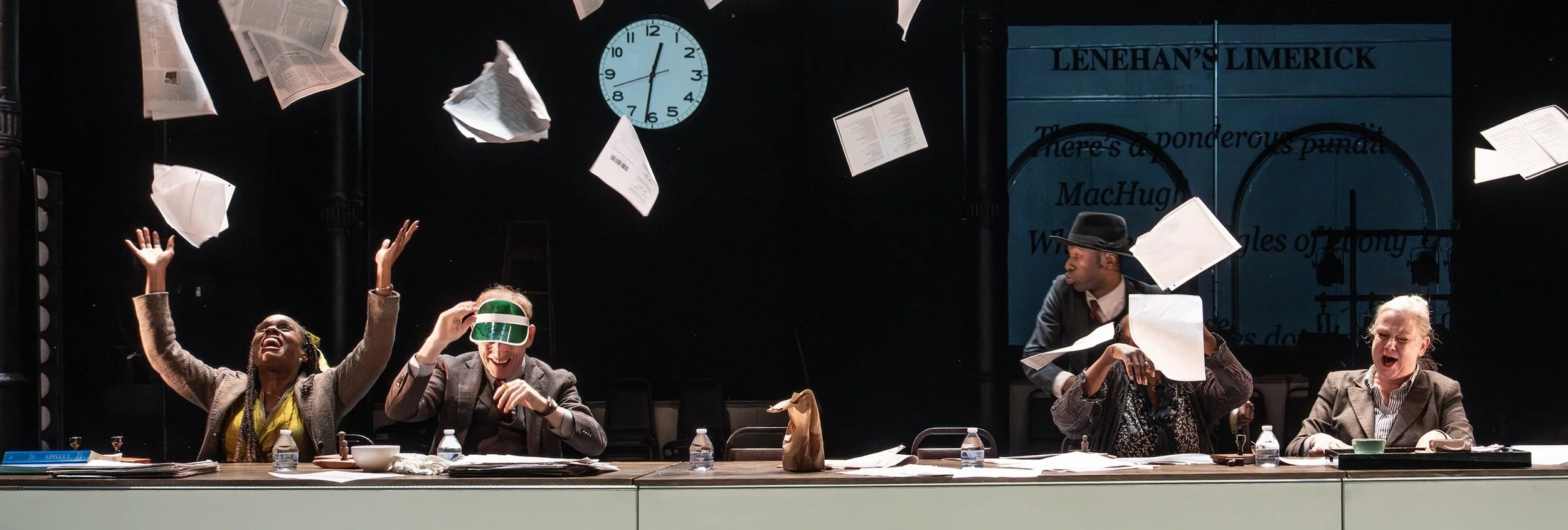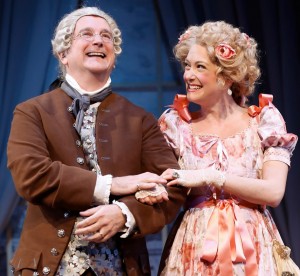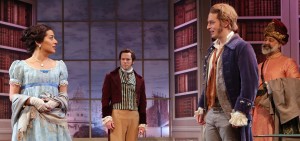By the time that Richard Brinsley Sheridan premiered The School for Scandal at London’s Drury Lane Theatre in 1777, the era of licentious, innuendo-ridden Restoration comedies had long passed. So, too, had the more recent heyday of sentimental comedies, which sanitized the dirty-minded plots and dialogues of the Restoration in order to produce what Sir Richard Steele called “a pleasure too exquisite for laughter.” With its good-hearted lovers and amoral gossips, Sheridan’s The School for Scandal fell somewhere between Restoration and sentimental comedy. Red Bull Theatre’s production of Scandal, directed by Marc Vietor, delightfully balances this classic play’s sweet, charming love story and its bawdy, boisterous comic gags.
Examining the foibles of 18th-century British society, The School for Scandal weaves several plot lines together. First, there is a salon of gossips, led by Lady Sneerwell, who keep a collective ear to the ground for any and every morsel of news about town. Lady Teazle, the young wife of Sir Peter, is one of Sneerwell’s lackeys and is becoming dangerously flirtatious with Mr. Joseph Surface. He and his brother, Charles, are vying for the love of Maria; but while Joseph is after her family fortune, his financially ruined yet idealistic brother truly loves her. Meanwhile, the brothers’ uncle, Sir Oliver, returned from the East Indies, decides to observe his nephews’ affairs in disguise.
Known for its curation of historical works with heightened language, Red Bull Theater is a venerated and well-supported Off-Broadway institution. The production values of Scandal’s costumes, lighting, and set design are remarkably high. Anna Louizos’s functional and dynamic set beautifully absorbs the precise lighting design by Russell H. Champa. Louizos and Champa take few risks in their designs, but this simplicity suitably frames the more ornate costumes and acting.
The wigs and costumes by hair designer Charles G. LaPointe and costume designer Andrea Lauer are themselves characters in this show. LaPointe’s wig creations for the play’s active gossips (including Lady Sneerwell, Mr. Snake, Lady Teazle, and Mrs. Candour) are as overdone and extravagant as the stories these characters fabricate in their salons. Lauer takes some historical liberties with her costume design, such as Mr. Midas’s mobster look and Lady Sneerwell’s leopard-print bodice, but her real shining moment is in her selection of colors and textures. Lustrous brocades, sparkling lace trimmings, dainty rosettes: down to the last detail, Lauer’s costumes take center stage in every scene. Viewers will delight in the curtain call, when the entire costume design comes together, revealing a veritable rainbow of characters.
This is not to say that the actors are upstaged by the resplendent costumes. On the contrary, the cast brings forth a delightful, stylized, and measured ensemble performance. This is an especially formidable accomplishment because of Sheridan’s love of soliloquies, which offer an actor plenty of opportunities to ham it up at the expense of other cast members. Each actor takes his shining moment, but no character seems to be pulling all the comic or dramatic weight.
As Sir Peter Teazle and Lady Teazle, Mark Linn-Baker and Helen Cespedes manage to elicit some likability amid their constant bickering. Though they are not so likable, the gaggle of society gossips is alternatively hilarious. Led by the Tony-nominated and Obie-winning Dana Ivey as Mrs. Candour, these colorful characters drum up energy and humor whenever the production begins to lull. Also notable are the vocal and physical comedic choices of Sir Benjamin Backbite (Ryan Garbayo), his uncle Mr. Crabtree (Derek Smith), and especially the foppish Mr. Snake (Jacob Dresch). Quadruple-cast in the small roles of Rufus, William, Hastings, and Trip, Ben Mehl manages to find a different delightful quirk for each servant.
Overall, Vietor’s direction emphasizes the skills of these well-trained actors, as well as the polished design elements. The infamous screen scene in Joseph's parlor is delightfully blocked for maximum ridiculousness. The pacing flows, and the jokes are well-timed.
The scenic transitions are their own little mini-vignettes. The production is, in a production sense, largely flawless. Paradoxically, the play's flawlessness is its only fault—and this is also the weakness of Sheridan’s genre. While it is nice to escape to a world in which good is good and bad is bad, the polished morality and well-made plot of The School for Scandal may feel too much like a fairy tale for a viewer to relate to it on a more personal level. Nonetheless, the production elicits laughs both light and hearty and is an excellent example of the genre.
Red Bull Theatre's The School for Scandal runs through May 8 at the Lucille Lortel Theatre (121 Christopher St. between Hudson and Bleecker). Evening performances are at 7:30 p.m. Tuesday and Wednesday and 8 p.m. Thursday through Saturday; matinees are at 2 p.m. Saturday and 3 p.m. Sunday. Tickets are available at the Red Bull Theatre’s website, redbulltheater.com, or by calling (212) 352-3101.








